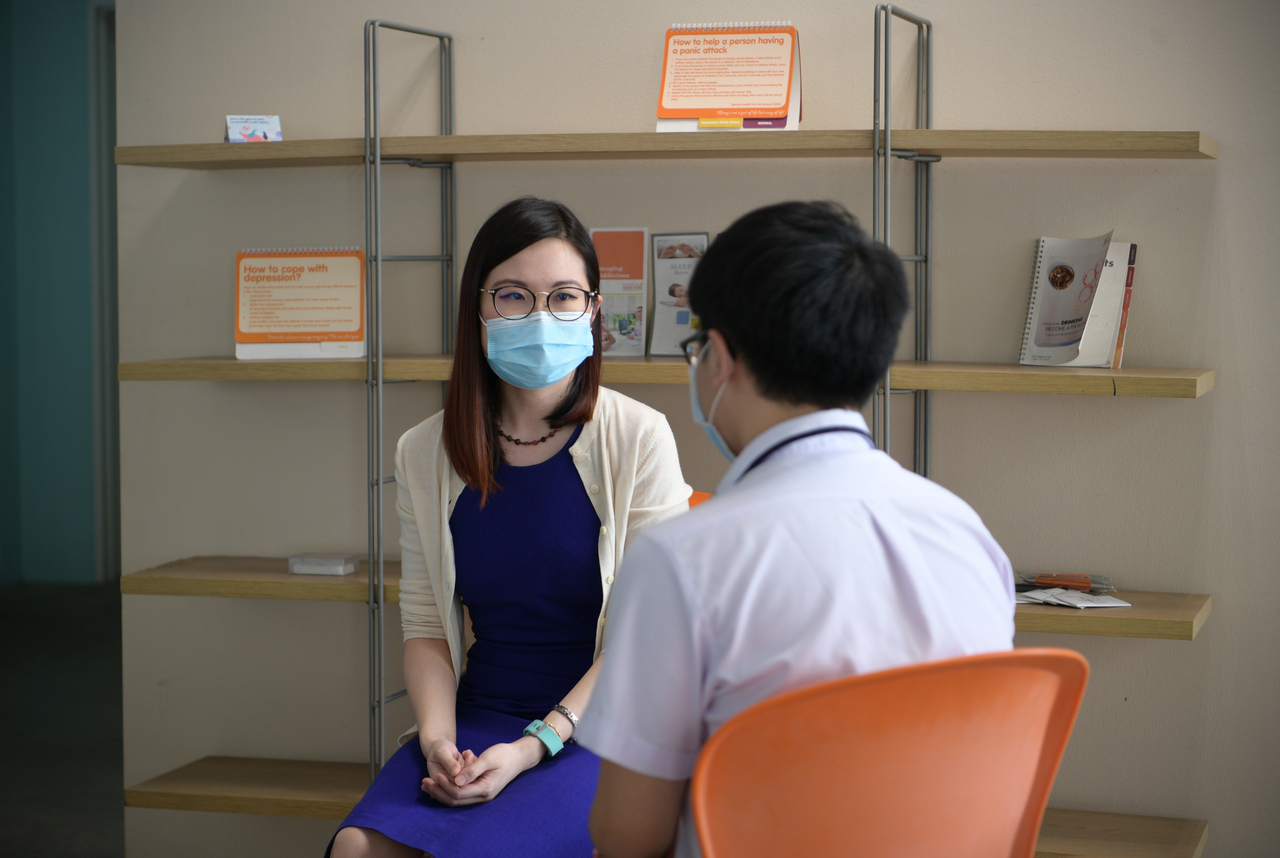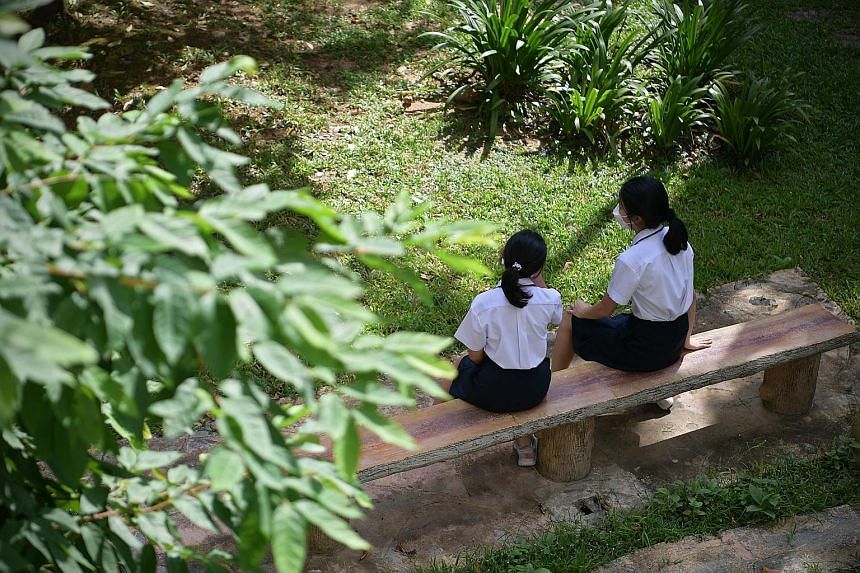More than counselling: How schools help students with mental health woes
Sign up now: Get tips on how to help your child succeed

There is a longstanding "ecosystem" in place in schools to support children and teenagers' mental well-being.
ST PHOTO: NG SOR LUAN
SINGAPORE - The secondary school student was distracted in class.
She would fiddle with her stationery, her homework undone.
Picking up on these uncharacteristic changes in behaviour, her teacher asked her if all was well.
As it turned out, tensions were rising at home. Her mother, a single parent, was struggling with financial problems and caring for a younger child with physical disabilities.
All these, plus domestic conflicts, were adversely affecting the student's mental health.
The teacher alerted the school counsellor to support the student, who also received help from mental health and community care professionals.
A family service centre provided her mother with counselling and financial aid.
Recounting the incident, Ms Lisa Lee, a master school counsellor at the Ministry of Education (MOE), whose job involves overseeing the work of counsellors in different schools, says: "I'm often impressed by our teachers with a keen sense of observation, who have the heart to sit down with a student after class to ask a simple, 'How are you?'"
While teachers are often at the front line when it comes to noticing when a student needs mental health support, there is a longstanding "ecosystem" in place in schools to support children and teenagers' mental well-being.
Helping the vulnerable
While the stigma surrounding mental health prevents some from seeking help even when they need it, this multi-layered approach in schools helps children with wide-ranging mental health challenges of varying severity, from excessive gaming, falling out with friends, adolescent challenges and academic stress to dealing with eating disorders and depression.
Last month, the alleged killing of one student by a schoolmate in River Valley High School shone a spotlight on youth mental health.
Speaking in Parliament after the tragedy, Education Minister Chan Chun Sing described support structures already in place in schools, from preventive efforts to programmes to identify students at risk and intervene when necessary.
He also unveiled plans for further support for youth mental health, such as deploying more than 1,000 teacher counsellors, who are teachers with additional training, within the next few years.
This is an increase from the more than 700 teacher counsellors currently deployed in schools.
There are also counsellors in schools who are able to refer vulnerable students to professionals such as those in the Response, Early Intervention and Assessment in Community Mental Health (better known as REACH) teams or other social service agencies.
Evolution of CCE
The mental well-being of students has been a feature of the school system for years, say Education Ministry officials, with more emphasis placed on mental health in recent times.
Mental health literacy has been enhanced in the revised Character and Citizenship Education (CCE) curriculum, which began this year at the lower secondary levels.
Describing the changes, which will eventually be rolled out across the board, Mrs Tan Chen Kee, divisional director of MOE's Student Development Curriculum Division, says: "The thinking behind CCE is to go further upstream in building all students' protective factors, to equip them with the skills to face the challenges in life.
"While mental health has consistently been in the curriculum, together with imparting values and thinking about one's life purpose, it has been further emphasised in the revised syllabus."
The latest incarnation of CCE, for instance, guides students in managing automatic negative thoughts (or ANTS), and seeks to help them distinguish between stress and distress, she says.
Its cyber-wellness module also features prominently, with students taught how to deal with online bullying and other stressors like the fear of missing out (FOMO), which is exacerbated through idealised images commonly posted on social media, she says.
Character education has been taught in local schools since 1959.
CCE, which is taught to students from Primary 1 to junior college and pre-university levels, was implemented in 2014.
Mrs Tan adds that CCE is not taught only in the classroom.
She says: "We are very conscious that a lot of learning takes place in CCAs (co-curricular activities), sports and outdoor camps, where there are opportunities for students to relate to one another, develop friendships and solve problems, to build up that sense of resilience."
She acknowledges, however, that the pandemic has put paid to many of these activities for now.
The National School Games, an annual school competition, was suspended last year, the first time in its 61-year history.
The games returned briefly in March with fewer events, before being called off when Covid-19 restrictions tightened.
Role of peer support
In his recent address to Parliament, Mr Chan spoke about how peer support networks are being set up in all schools, where students look out for one another.
MOE's Peer Support Programme has a long lineage.
It was first introduced to secondary schools in the 1990s, with some schools calling these networks Buddy Systems.
Schools foster a peer support culture with a two-pronged approach.
First, through CCE, students are equipped to be peer supporters by being taught to be kind and caring, and to recognise signs of distress.
Second, schools select and train at least 5 per cent of students as peer support leaders to actively look out for their peers.

These student leaders are trained in active listening skills and taught to respond to others with empathy, manage conflicts and encourage early help-seeking and positive coping strategies among their peers.
Mrs Tan says: "Our grand vision is: Every student a peer supporter."
She adds that peer support leaders are themselves supported by teachers who check in on them regularly.
"We are very clear with our young people that they are not there to solve their friends' mental health issues. This is repeatedly explained and they are always encouraged to reach out to trusted adults like their teachers and counsellors."
Mr Muhammad Syazan Saad, 20, was a peer supporter who found that the experience benefited himself as well as others.
A recent graduate from Temasek Polytechnic, he spent three years there as a peer supporter and volunteered in mental health-related community projects.
Mr Syazan, who is waiting to enter national service, says: "People tend not to know what to say when others around them have mental health challenges.
"I learnt to practise the mantra: listen, acknowledge and validate, and learnt to support others.
"At the same time, I also found ways to cope with feelings of anxiety that I sometimes experience."
Equipping teachers
Teachers and counsellors are an important part of schools' systems of support for students.
All teachers are equipped with basic counselling skills and are meant to keep a watchful eye over their students, provide a listening ear and reach out to students if they sense something is wrong.
Students also have access to another group of teachers with specialised training, known as teacher counsellors, as well as a school counsellor, who is able to provide dedicated support.
Anna (not her real name), 18, received help from two form teachers and two counsellors in her darkest days in secondary school.
Now an Institute of Technical Education student, she attempted suicide at the age of 14.
When she was about to jump, she called her form teacher, who rushed over, calmed her down and called the police.
Anna says: "I was shocked. I didn't expect her to come."
She had been confiding in her teacher about her problems and knew her teacher's phone number from the class WhatsApp chat.
"She was like a mother figure to me," she says.
After the incident, Anna was diagnosed with major depressive disorder, borderline personality disorder and bulimia.
From the ages of 14 to 16, she was admitted to a psychiatric ward several times.
Her teachers and counsellors visited her in hospital, bringing small gifts like colouring books.
Now in recovery, Anna says: "I'm thankful that they cared about me."
Ms Choy Wai Yin, director of MOE's Guidance Branch, in charge of student well-being, says MOE hopes to normalise the discussion surrounding mental health.
"Help-seeking is a strength and not a sign of weakness. It takes a lot of courage to say, 'I have a problem'," she says.
But she notes that barriers to accessing help, even when it is available, remain. "We have this whole ecosystem of support, but mental health issues are complex."
Some parents are hesitant to share what is happening at home, while others prefer to manage on their own, she says.
Conversely, students may not want to tell their parents their problems for fear of burdening them or being judged. Both sides may also feel the current distress is "just a phase", she says.
But Ms Elaine Tay, a senior school counsellor at Jurong Pioneer Junior College, says a collaborative approach, which includes all parties, is helpful.
"We want to work closely with the parents, even if they sometimes feel they are at a loss about what to do. What helps is when we work together with the parents to support the child," she says.
At her school, more students have been referring their friends in distress to her. It is an encouraging sign, she says, of a greater openness to seeking help.
Getting help
National Care Hotline: 1800-202-6868 (8am - 12am)
Mental well-being
Fei Yue's Online Counselling Service: eC2.sg website (Mon to Fri, 10am to 12pm, 2pm to 5pm)
Institute of Mental Health's Mental Health Helpline: 6389-2222 (24 hours)
Samaritans of Singapore: 1800-221-4444 (24 hours) /1-767 (24 hours)
Singapore Association for Mental Health: 1800-283-7019 (Mon to Fri, 9am to 6pm)
Silver Ribbon Singapore: 6386-1928/6509-0271 (Mon to Fri, 9am to 6pm)
Tinkle Friend: 1800-274-4788 (Mon to Fri, 2.30pm to 5pm)/ Tinkle Friend website (Mon to Thu, 2.30pm to 7pm and Fri, 2.30pm to 5pm)
Institute of Mental Health's Mental Health Helpline: 6389-2222 (24 hours)
Samaritans of Singapore: 1800-221-4444 (24 hours) /1-767 (24 hours)
Singapore Association for Mental Health: 1800-283-7019 (Mon to Fri, 9am to 6pm)
Silver Ribbon Singapore: 6386-1928/6509-0271 (Mon to Fri, 9am to 6pm)
Tinkle Friend: 1800-274-4788 (Mon to Fri, 2.30pm to 5pm)/ Tinkle Friend website (Mon to Thu, 2.30pm to 7pm and Fri, 2.30pm to 5pm)
Counselling
TOUCHline (Counselling): 1800-377-2252 (Mon to Fri, 9am to 6pm)
Care Corner Counselling Centre (Mandarin): 1800-353-5800 (Daily, 10am to 10pm)
Care Corner Counselling Centre (Mandarin): 1800-353-5800 (Daily, 10am to 10pm)
- This story was produced in partnership with the Ministry of Education.


